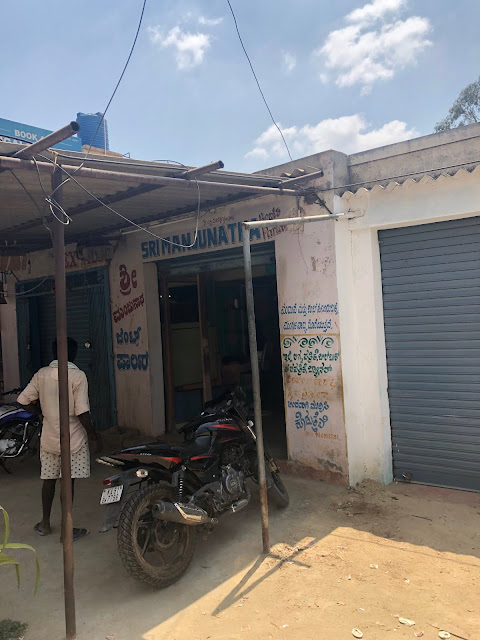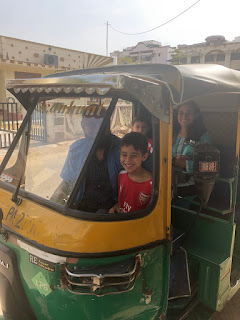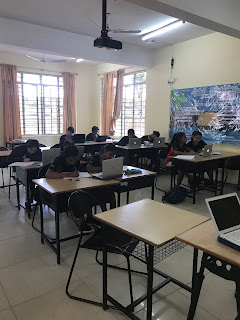John's World...Reader questions one
 |
| My barbershop |
DT and RT from Natick asked about how I was getting along not knowing the language and if that was a barrier getting along in India.
To me, language isn’t a simple function of speaking and
being spoken to. It’s a process of
understanding. Spoken language is only
one vehicle of understanding as far as I’m concerned. Writing, hand gestures, facial contortions,
pointing to objects, laughter, non-verbal shows of respect, all are vehicles of
understanding. If you only rely on one,
you run the risk of not being understood.
You do your best with all forms of communication. You try.
Effort is universally understood.
A touch of the heart and a simple “Namaste” brings a smile to the
elderly folks here in the villa. I’ve
made the effort to show respect. I do
utilize an app called “Itranslate” when I need to use spoken language. Often times here in rural-ish India, Hindi
and English aren’t spoken. Kannada,
Tamil, Malayalam, are all spoken here.
My app has helped me a few times get to where I need to go or get
something I need. To be honest, having
patience and a light heart during communication (ie not getting frustrated) and
relying on other forms of communication has worked out well. You might say I don’t see barriers but rather
opportunities to use other ways to communicate.
At the market I have found that I am using the South Indian terms for
food quite well when speaking. So I
guess I speak “food” fluently.
 |
| This should be an international law |
RR from Rosindale asked what a "typical" day was like for me.
Thanks RR from Rosindale.
A day for me typically begins around 630 or earlier. I get up, start the coffee and tea (for
Brinda and the housekeeper). I like to
get Brinda’s breakfast going and set out some early morning juice and cookies
for the boys (they eat breakfast at school).
I walk the boys to school around 8am.
The housekeeper comes around 9am.
At that time, I have started the laundry for the day. While the laundry is going and the
housekeeper is here I meditate. After
meditation I like to get about an hour’s worth of reading in. Around 11am-noon I set out the laundry to dry
and grab a light lunch. After lunch I do
a little soccer training for an hour down at “the grounds” (shooting, ball
control drills, etc.). I then come back
home, shower, and then either read some more or do some shopping. 3pm is pickup for the boys followed by
starting dinner. Our nighttime routine
is pretty much the same here as in the US.
Dinner, showers for kids, stories, and bedtime for them. From 8-11pm I like to fit in a cardio workout
and watch some sports on TV (it’s now IPL cricket). I try to get to bed around 11pm.
 |
| Chris Gayle. Punjab XI batsman and one of the world's best ever. Fandom. An international language |
BT from Sarjarpura asked for my take on several aspects of living in India.
Thanks BT from Sarjarpura.
Great questions. I will handle
some of those topics separately in the near future. For now I’ll talk about tipping. As I’ve talked about earlier, for the most
part, language isn’t really a barrier here.
When it comes to tipping or bartering (a much longer topic of
discussion) everything feels awkward. Tipping
in the US is more or less an entitlement.
Overtime, because we pay people in the service industry in the US so
poorly, we empathize and “tip” them for even basic service. In countries where people are paid a “living wage”
for their service work, tipping is rare if not frowned upon. For example, order a drink at a bar the in US
and you will customarily tip the barkeep for each drink or at the end of the
night. Try to tip in the UK and you will
get a look of distain or a set of rolled eyes at you. The British pay people in service industry
well and people in that industry have pride in what they do. A tip is seen by them as demeaning.
Tipping in India is, to say the least, confusing. Indians almost NEVER tip for anything even at
a restaurant. The reasoning given for
this is the same as in the UK. The staff
are paid a decent enough wage. For me
though, I recognize that a living wage in India is very different from a living
wage in the UK and Europe. In Europe, you
can live comfortably off your wages with health care, education, and housing
more or less subsidized. You may have “good”
wages in the service industry but no welfare system to act as a backstop in case
things go bad. Most people that I
interact with make less than a dollar a day.
They live, in some cases, hundreds of miles away from home and their
families. There really isn’t a sense of
worker rights here, so they know they could be out of job tomorrow. Homeless.
Penniless. That is a
reality.
So I tip.
Indians bemoan foreigners coming in with this practice. Truthfully, over tipping could be a serious
problem. Indians would be expected to
pay tips at similar rates. I see
that. I just don’t see the point in groveling
over a delivery boy or taxi driver getting 50 cents more or less for a job well
done. In the absence of decent welfare
programs, tipping, in my opinion, helps make the lives of those in the service
sector more agreeable.
 |
| Don't feel that tipping someone living here 50 more cents is a bad thing. Get a welfare system or get over the fact I tip. |
Thank you all for your questions. For all of you reading, please ask more. I have a blast thinking about the questions you ask. Its fun. Again, please feel free to ask any question. Send questions to jneiswender@hotmail.com with the subject title "Fulbright".
Spare thoughts...India is abuzz with the elections coming up. It's all the talk. Nationalism is everywhere and honestly is expressed in positive and negative ways. Just like in the States. For the low down on politics in India watch "Patriot Act" on Netflix with Hasan Minhaj. Watch the show on the Indian election. It's fantastic and unfortunately true.



Comments
Post a Comment